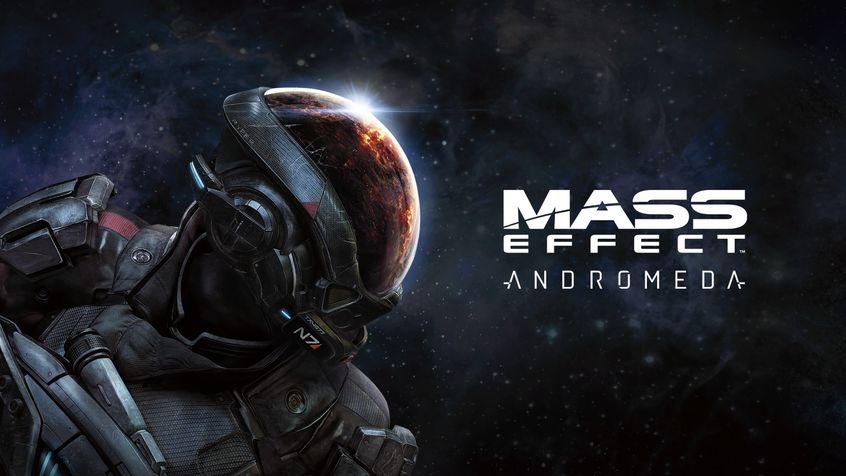Mass Effect Andromeda
Mass Effect is one of my favourite video game series. I don’t think I’m alone in that sentiment - Mass Effect is a fundamental element in much of its audience’s understanding of what a video game can do as a narrative engine. Beyond the series’ pure game mechanics and design, the story it chooses to tell of the accumulation of Sheperd’s trauma, of how that trauma shapes the relationships around her and the actions she chooses to take, and what heroism ultimately looks like presses up against the very ideas of how stories and ideas can be told. It’s a phenomenal trilogy, and I will eventually replay and review it here.
This review isn’t about the original Mass Effect trilogy. This review is about Mass Effect: Andromeda.
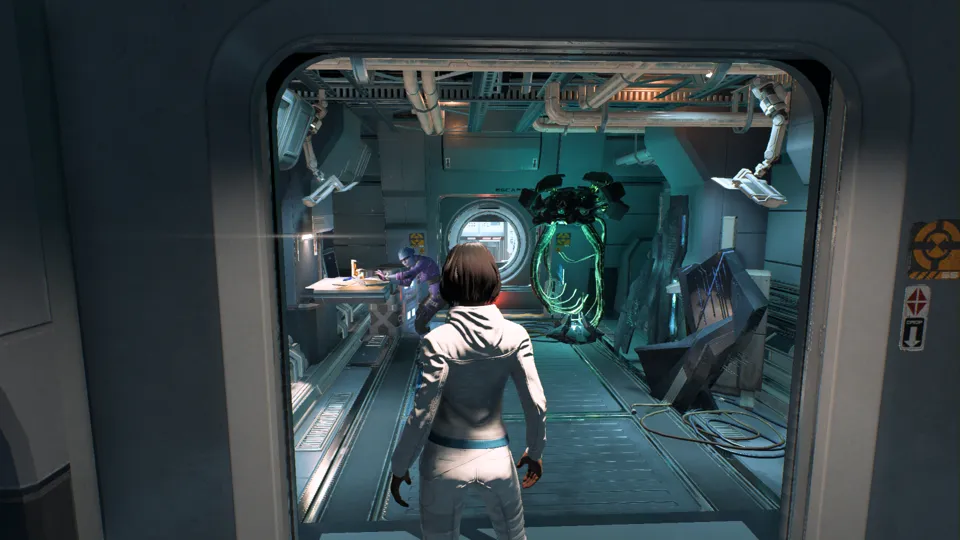 It’s still a Mass Effect game, though, since we’re doing weird space things in space.
It’s still a Mass Effect game, though, since we’re doing weird space things in space.
On the surface, Mass Effect: Andromeda is not particularly different from its predecessor. You play as Ryder (one of either Scott or Sara, though I played as Sara), a member of the Andromeda Initiative, an expedition that embarked from the Milky Way galaxy prior to the events of the original Mass Effect trilogy searching for new lands and adventure in the Andromeda galaxy. Upon arrival in the Andromeda galaxy, the Andromeda Initiative not only finds those new lands and adventures, but new adversaries, challenges, and things that would like to shoot their ships out of the sky. Ryder assembles a team of friends (and Cora), goes on missions, solves problems, and rights the great wrongs in the galaxy. It is, essentially, a Mass Effect game.
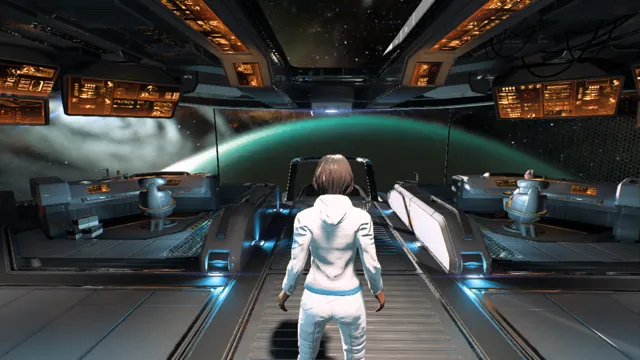 In this one, you can wear a hoodie in fancy diplomatic meetings!
In this one, you can wear a hoodie in fancy diplomatic meetings!
However, it’s not a secret that Mass Effect: Andromeda was not as well-received as its predecessors. I’m playing this game six years after its initial release, well aware of the reaction it received upon its release, and I’m not going to pretend that didn’t influence my initial impressions of it. Indeed, when my friends first noticed I was playing it, I kept a running commentary on the various bugs and bizarre design choices the game made, and we all laughed about them together. I am not, nor will I pretend to be, unbiased.
That said, I’m not here to rehash the (valid) criticisms that have already been levelled ad nauseum at this game. Character’s faces are weirdly animated, and facial expressions don’t always make sense for what the character is saying. The decision not to have a quicksave button, or to have long stretches of time with no save option whatsoever is a maddening one that reflects a certain conception of who is playing this game that does not match the reality of its actual audience. The camera movement made me motion sick from time to time, and I couldn’t alt-tab without putting the game into an inescapable windowed mode. There is a lot to say about graphical choices, but these are not what make the game. I have played many games with questionable graphics. I won’t pretend I do not care about graphics, but Mass Effect: Andromeda’s graphics were not bad to the point that I cared. The landscapes looked pretty, and the characters more or less conveyed what they were supposed to convey. That’s good enough for me.
No, I am much more interested in discussing the fundamentals of the game. Let’s dig into the decisions that were made when deciding what kind of open world this would be, and the story that was written to explore it.
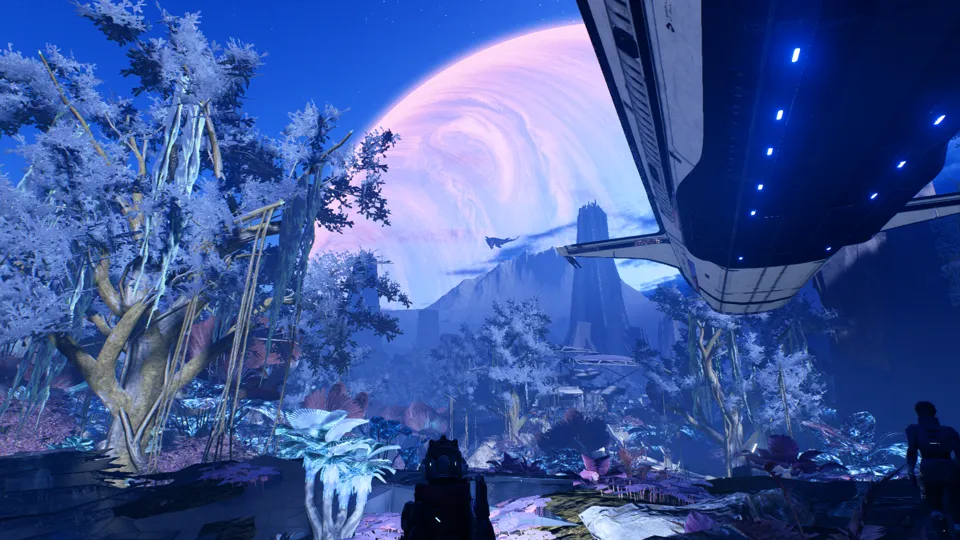 It is very pretty, though.
It is very pretty, though.
Let’s be clear - the story in Mass Effect: Andromeda is thin. It exists as a justification to explore the various planets and quests the designers have built. You are here on a colonial mission, to find and tame new planets for the Milky Way colonists, and maybe solve some problems along the way. Ryder’s entire purpose, her entire raison d’etre, is colonisation. Battles against a cosmic foe, alliances with native aliens, all of these exist solely for the purpose of rendering worlds previously unfit for human habitation habitable.
Already the problems with the story of Mass Effect: Andromeda become clear. Colonialism and its implications and consequences are not to be taken lightly, but Mass Effect: Andromeda does exactly that. Within the first hour of the game, Ryder crash-lands on a planet, gets in a fight with the first aliens she meets, listens to her companions say very racist things, and gets upset when the planet she thought would be humanity’s new home is not, in fact, theirs. It is a first contact narrative that is all too familiar - it is the first contact narrative of a conquistador arriving in Mexico, of the English arriving in New England, of the Dutch arriving at the Cape. It is the first contact narrative that ends in devastation for the one whose perspective we are not following.
This fundamental issue with the story Mass Effect: Andromeda is telling lies in that truth that it never seems aware of what it is or the implications of what the player is doing. As Ryder travels from planet to planet, she fulfils various tasks that fundamentally reshape the landscape of planets that don’t necessarily need reshaping, except for the benefit of colonisers. On the frozen planet of Voeld, for example, Ryder activates terraforming equipment that will heat the planet and thaw its ice. This serves to make the planet a good home for humanity, but the local species living there - the angara - don’t need this for the planet to still be their home. Indeed, the changing climate will likely dramatically impact the population of wildlife the angara believe are sacred and who live under the ice. What matters for Ryder isn’t stability in Andromeda, but colonisation without consideration for who is impacted.
The colonial narrative and lack of self-awareness around it only heightens when the two native alien species of Andromeda - the angara and the kett - are added into the story. These two peoples fit a simple mould of the political landscape of Andromeda. While the Milky Way had dozens of species of varying political power and influence, the Andromeda galaxy has these two, divided into the good aliens (angara) and bad aliens (kett). The kett are bad because they are warlike conquerors and don’t want to be friends with humanity, and the angara are good because they accept humanity. As the game goes on, we learn that the angara have been conquered by the kett and have been fighting a losing resistance against them. Though the heroism of individual angara is lauded - and especially that of Ryder’s angara companion, Jaal - it isn’t until Ryder arrives that they are able to make any progress in that resistance. Ryder sallies in on her literal white ship to serve as a white saviour, liberating the literal people of colour from their nemeses, and in exchange, asking only that her people be allowed to live on their sacred worlds, trade with them, and enjoy their knowledge of how to survive in Andromeda.
Mass Effect: Andromeda is the precursor to a genocide simulator. It’s that calm before the full colonial storm arrives, before the next wave of settlers, before there’s not enough space or resources, or the Milky Way aliens just want more than the angara will give. It is a white-washed, white saviour, colonialism-as-civiliser narrative, unexamined and unquestioned.
Nowhere in the game are the flaws of the particular story it’s choosing to tell or how it’s choosing to tell it more evident than on a planet midway through the game called Kadara. Kadara is introduced to the player as a crime-ridden hellhole governed by the lawless and only of interest because it potentially grants a lead on how to eliminate the kett entirely. Kadara had once been an angaran trading port. By the time Ryder arrives, it is instead ruled by humans who left the Andromeda Initiative and decided to carve their own path through Andromeda. Kadara sees a power struggle between the ruling group of humans and a rival group, with Ryder’s goals of establishing a colony on the planet caught in the middle.
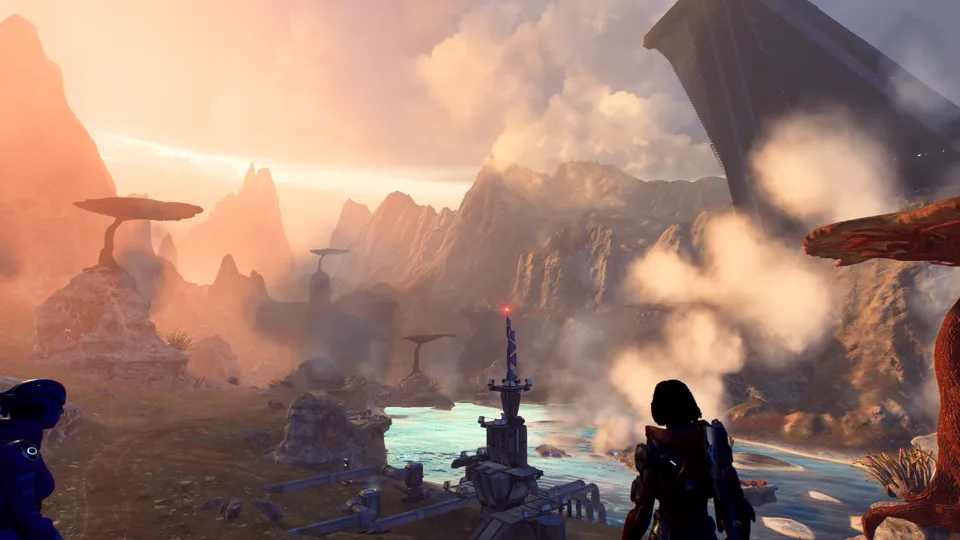 Also, it’s very pretty.
Also, it’s very pretty.
There is immediate potential in this set-up. Rival factions give the opportunity for differing perspectives, and angarans driven from their homes by arriving humans give the potential to finally explore the unstated elements of the colonial story thusfar. Kadara’s story, as presented, gives an opportunity to critically examine the narrative the game has been telling about the good Ryder is doing by rendering planets fit for habitation by humanity, deconstruct it, and potentially bring the game in a new and more interesting direction.
This is, of course, not what happens.
Instead, the game fleshes out no elements of the story, instead resolving the dispute through a quick time event, and sending Ryder out to shoot faceless mook after faceless mook.
This is the true failing of Mass Effect: Andromeda. Its story is one that needs justifying and deconstructing, but it has no interest in doing so. Instead, every element of its quest design and story writing is shallow at best, if it exists at all. Planet after planet is filled with missions to fetch ten rocks or scan five mushrooms or eliminate three bases without any real investment. Though Mass Effect: Andromeda has a massive, open world, it at no point invites the player to explore or engage with it. Quests spawn and invest nothing in either showing the player why they matter or asking the player to explore or think about what they’re doing or why. As an example, one quest on Kadara took place entirely within a cave. While exploring, I stumbled into the hideout of the rival faction. Rather than learning anything about them or even being greeted with hostility as an outsider, was given a quest to scan three members of the group, then report back. This was the entirety of the questline of the faction. There was nothing to it, no heart or choice or even mind behind it. It is a game where its quests are stupid, and the game assumes you are as well.
This is the crux of the game. At every turn, it assumes you, the player, are stupid, and the game is built around that assumption. The worlds are empty and flat and uninteresting to explore because they have to be. If the worlds had character or something more than a pre-built road and mining zones, you might question why you’re needing to “tame” this place, or if you have a right to do so. If the various bandits or roekaar resistance fighters or outlaws have any character or motivation, you might question whether they actually have a point, and whether you are actually on the right side of this struggle. The game makes the world stupid because Ryder must either be willfully stupid or malicious, and neither is the experience the game wants you to have. The game treats you like you’re stupid, because if it doesn’t, you recognise that what you’re doing, and what this game is espousing as the right thing to do, is wrong.
Developer: Bioware
Genre: Role-Playing Game, Action, Cover-Based Shooter
Year: 2017
Country: Canada
Language: English
Play Time: 90 Hours
Youtube:
